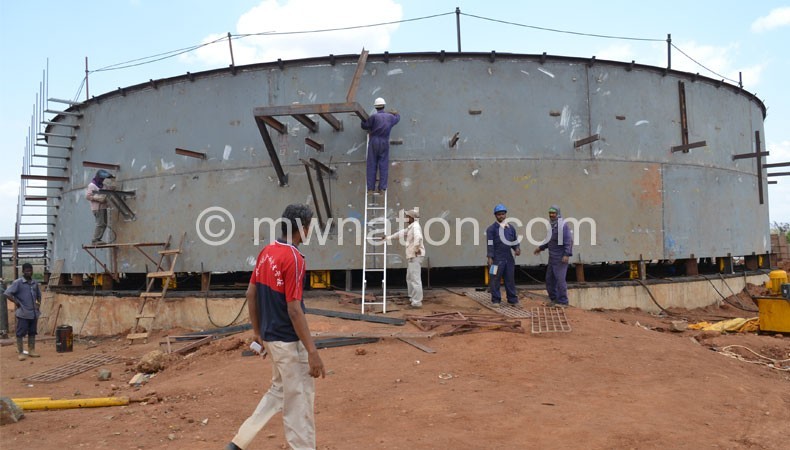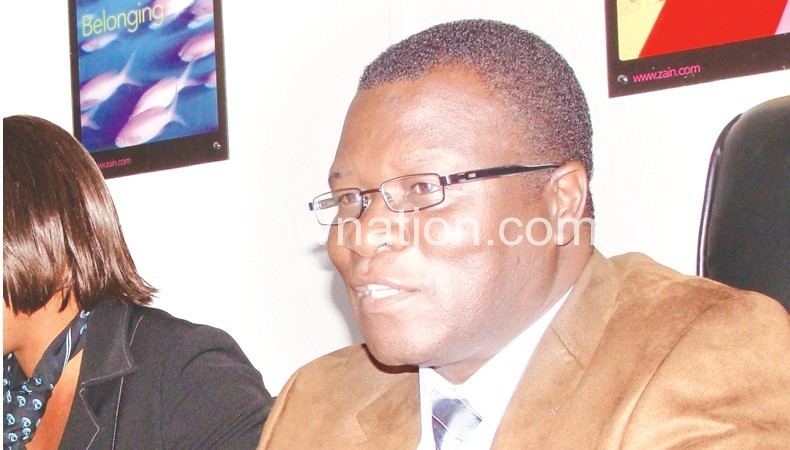K65BN FUEL WAR
War for the control of Malawi’s K65 billion ($150 million) fuel market has ensued between two fuel companies—government-owned National Oil Company of Malawi (Nocma) and privately run Petroleum Importers of Malawi (PIL).
Nation on Sunday investigations show that the cause of the fight between the two companies was Malawi Energy Regulatory Authority’s (Mera) decision to introduce a Bulk Procurement System (BPS) and management of Strategic Fuel Reserves (SFRs) for the country concurrently with changes on the mode of purchase of fuel and its storage.
The Competition and Fair Trading Commission (CFTC) has since launched a market inquiry into the oil industry to ensure healthy competition.

Bone of contention
PIL is currently controlling 100 percent share of the fuel market in Malawi, but government-owned Nocma believes it should be the one that should control fuel supply in the country, a position that worries PIL.
PIL—a consortium of fuel companies—doubts the capacity of a State-owned company to control supply of fuel, considering how Petroleum Control Commission (PCC) messed up the fuel importation through corruption and political interference. PIL also sees a conspiracy within the State architecture to kill it off by crippling its fuel importing ability.
Government abandoned its mandate to control the fuel industry when Mera was established to take some of the duties of PCC, leaving the duty of purchasing fuel to PIL, a company managed by local fuel retailers, which came to life in 2006.
However in 2010, government established another company, Nocma, albeit with a different mandate, at the height of the Bingu wa Mutharika era fuel shortage crisis.
At the time, the administration argued that the State firm would ensure security of supply that private importers could not guarantee given their reluctance to invest in fuel storage facilities.

Nocma’s position
In a paper on Implementation of the Bulk Procurement System which Nocma has been selling to potential financiers, the company positions itself as best-placed to be awarded a contract to be buying fuel for the country.
Malawi borrowed money from the government of India to construct strategic fuel reserves, which are expected to keep 60 million litres of fuel at the cost of about K24 billion ($55 million) hence, Nocma is positioning itself to be the supplier to the reserves and that country’s retailers should be drawing from national reserves.
In the paper which Nation on Sunday saw, Nocma believes the current market controlled by PIL only benefits the consortium and also accuses PIL of profiteering from the current system.
Nocma also claims that the consortium over-relies on interest income from their cash war chest as opposed to industry margins. Nocma claims PIL enjoys 90-day credit terms from internal suppliers, which helps the company accumulate huge cash reserves before the settlement date. PIL and its member companies, claims the State firm, reinvest the cash in the money market where they make a killing.
“This means that the balance of approximately 65 to 70 days of the [90-day] trade credit is held in the form of cash or near cash. The sad part being that while this cash is earning interest in the hands of the importer, the foreign exchange rate risk sits with the public through the Price Stabilisation Fund [PSF],” reads the paper.
Nocma proposes that instead of keeping the proceeds of the long trade credit that the public finances on a private company’s bank account, the economy should use the credit line to fund its fuel stocks and give security of supply to all.
Nocma also alleges that these windfall gains have not gone towards investment in expansion of storage, but rather towards marginal investments in the form of service stations mostly crowded in the country’s cities and towns.
“By way of example, within a radius of 2km from Lilongwe City Centre, we have a total of seven service stations and we have just added one more to bring the total to eight service stations,” reads the paper.
Nocma also argues for a single importer, adding that the current procurement arrangement, where the original four tend to treat any new comer into the industry as an interloper who is to be accorded second-class rights and only tolerated as a “customer”, has stifled growth in the sector.
PIL’s response
But PIL has described Nocma’s position on the consortium as based on incorrect information, arguing the company operates a business which has largely been cost neutral.
PIL general manager Enwel Kadango said the consortium is already doing bulk importation of fuel and for the past 14 years, the company has been doing bulk purchasing with strict controls, adding that the country has benefitted from the economies of scale.
He said in this year’s fuel tenders, the company saved a record $6 million (about K2.7 billion) in premiums.
“We all still remember the Petroleum Control Commission issues during the time it was importing fuel. The change was made to the current system and mainly to be done by private sector due to accountability, efficiency and governance issues which is critical in delivering fuel to a country like ours.
“From our point of view, we fail to understand why a lot of pressure is being put on things which are working perfectly at the moment. The country has had good fuel supply since 2012 when the kwacha was floated and automatic pricing were made fully operational. Are we trying to fix something which is not broken? I am sure this energy could best be employed elsewhere,” he said.
On profiteering claims, Kadango explained that PIL for 11 years managed the importation without being paid import levy of K2/litre, which was only introduced after some other importer asked for it.
“PIL operations up until 2012 were cost neutral to the consumer,” Kadango explained, saying it was Mera that introduced the K2/litre in 2012.
“PIL can operate without the import margin in principle. The company operational costs are largely funded through treasury management,” he said.
Kadango said the import margin income was very little to manage the company’s operations considering that PIL was only importing 14 million litres having accommodated six million litres from Nocma stranded volume of their 2013 contracts which tendered parallel to PIL signed contract for that year.
On PIL over-relying on interest income as opposed to industry margins, Kadango said his company’s treasury management uses some nominal interest to cover the company’s costs of operations.
“Please note that MRA are paid duties and excise duty [21 percent compounded] within 14 days from the day the product enters the country. As soon as funds are received from PIL customers, levies are paid [39 percent of pump price, payable on 45th day from receipt of product], transporters are paid on same 45 days cycle; hence, one can calculate that very minimal amount is left for investment.
“This money by the way is left as cash cover in the bank where the letters of credit [LC] were established. PIL does not invest this money with any money markets in the country,” he said.
Kadango also dispelled claims that PIL earn handsome treasury management gains through investing proceeds from the 90-day credit cycle, saying: “When we import, we pay the supplier in 90 days, our customers pay PIL in 45 days. Thus, money from the customer to PIL goes straight to the account in a bank where we got the LC for the product lifted.”
“Our focus is to ensure the country has fuel all times. We believe in our policy which is to bring fuel into the country in a cost-effective manner that is efficient and economical,” he said.
On claims that service stations are crowding cities and towns, Kadango said PIL customers place service stations in various parts of the country after thorough research.
“By the way, these places are duly approved by the regulator. I wonder why someone would want a company to open a service station in a place where there are no cars just for the sake of being present there,” he said.
Mera says cannot take sides
Mera communications officer Fitina Khonje said Nocma can do any business as provided in its Articles of Association.
“Mera is not the right authority, therefore, to define the mandate of Nocma. Mera is an independent regulator who has no preference for Nocma or PIL. It treats the two and all other importers equally,” she said.
Nocma was established to spearhead oil and gas exploration, promote competition and equitable access to liquid fuels and gas, and manage the country’s strategic fuel reserve facilities.
CFTC, however, said since oil is a strategic commodity in Malawi, it has launched a market inquiry to ensure healthy competition and efficiency in supply chain distribution.
Said CFTC’s director of consumer welfare and education Lewis Kulisewa: “The market inquiry seeks to assess the level of competition in the oil sector and identify any factors that may impede competition in the market.
“The market inquiry is being conducted in collaboration with Mera. This is in the spirit of the MoU signed between the two organisations. Results of the study will be published and shared with the general public.”






I don’t know what is what, but for sure I know that Robert Mdeza who is heading Nocma was once the CEO of PIL and he knows what he is talking about.
NOCMA is a statutory corporation, while PIL is a private oil company. Those of us who have worked for IPSU (former private importer), PCC a regulator/importer, PIL and NOCMA know how vulnerable to political machinations a statutory body is. Even MERA has been politically compromised and is not doing the job it needs to do. Now, the combination of MERA and NOCMA is taking us back to the days of PCC, and may not be good for the country.